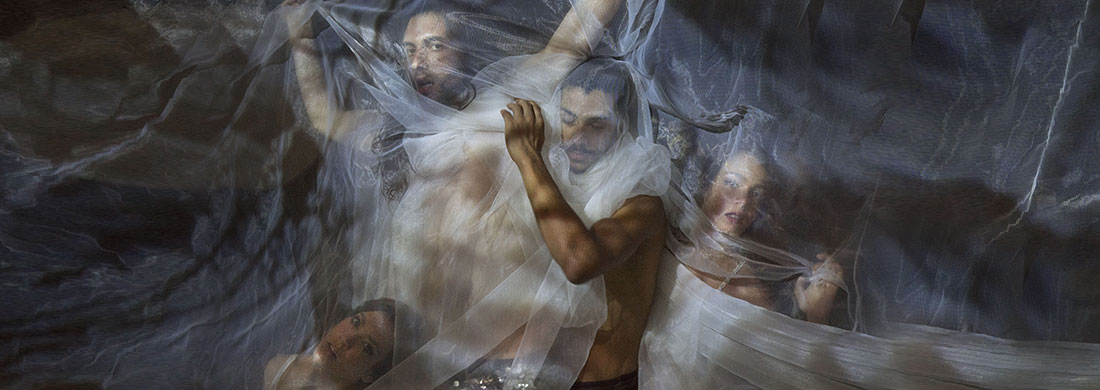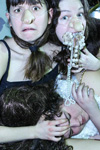


|
||
 | ||
Dear Friends, - Since my stay in China and the conversations I had there about art and public space, and also conversations about the ruthlessness of a dictatorship and its influence on the arts, I have taken a different view of the relationship between art and society. So, for example, I follow very closely the controversy about a boycott of Israel. I don’t believe a boycott would help. A boycott lets down a lot of good people. I am currently writing a play as a result of meeting Elik Niv, an Israeli dancer and former elite soldier. In the last few years I have had several opportunities to get to know several Israeli artists better, including a joint project with the marvellous Idan Hayosh. As a result of a strict Jewish education and demanding military training, they are all people with a completely different view of the society they live and survive in. They are artists from whom docile Flemings like me can learn a lot. The Middle East is creaking and groaning in its search for a possible way of living together, and from the outside it is incomprehensible that there can be so much hatred. There is a lot of legitimate criticism of Israel and its occupation policy, but a boycott by artists is a feather in the cap for those in power. In China I have been able to experience a little of what it means to be an artist in a dictatorship: the evening before the opening of my exhibition in the museum of contemporary art, a delegation from the museum came to ask me to remove several works. Until that moment our collaboration had been very open and warm. So what was the matter now? It turned out that on that day the president would be giving a long-awaited speech on his outlook for the future of China. It was feared that he would praise the Cultural Revolution. Millions of Chinese were at the ready with banners showing Mao and Xi. Back to the seventies. My curator feared that they might close down the whole show. At first the speech didn’t take place. But then at four o’clock in the morning the president appeared on television after all. He said that the Cultural Revolution had been a mistake. Great jubilation in the cultural world. That night we re-hung the works that had been removed. At the opening there were thousands of people who looked at my work critically, but with an open heart. It was followed by debates on the themes of beauty and dictatorship in the exhibition. The censorship committee just looked on.
- A lot of discussion has arisen about what are called the ‘Eighties Crowd’ in Flanders. I can’t understand why a number of journalists want to create a rift between different generations of artists. (Those old dodderers should just die off, they use drugs to keep themselves going, they hold back any form of renewal, they are concerned with power rather than art and have a monthly salary with which a young company could make a whole production.) I myself have always tried to make sure my work was presented to the broadest possible range of audiences. For that purpose I have thought very hard about form and content. If some of my productions attract a total audience of between sixty and a hundred thousand, it is not because I sit on a throne in an ivory tower, but because I have always given priority to the dialectical relationship between art and the society in which it is made. At Needcompany we earn very ordinary wages, we do not have a position of power, and a lot of young artists make their hesitant entrance through our ever-open door. I have never been politically naïve, but even now I still say to young people who want to get started that they should at the very least aspire to change the world. And that ambition is to be found in abundance among the younger generations. The rift that journalists want to create is therefore reprehensible and comes very close to the reactionary moaning of, oh yes… their generation of politicians who are now gradually getting their hands on power and were also too young to have consciously experienced those obscure 1980s, are afraid of the future and engage in building walls. And for those reviewers who have asked us to die, I refer to ‘my’ Grace, who says: "I like dancing with death, even though I absolutely hate it".
| ||
 |
Lemm&Barkey are presenting the world première of FOREVER, their latest work, based on Gustav Mahler’s ‘Der Abschied’, at the steirischer herbst festival. When the composer Gustav Mahler was diagnosed with a fatal heart disease, he wrote to a friend: "I have lost everything I have gained in terms of who I thought I was, and I have to learn my first steps again like a newborn." It was in this mood that Mahler wrote ‘Das Lied von der Erde’. The last of these songs, ‘Der Abschied’, was to be one of his most personal works, one that reflected his state of mind. Man’s struggle with his mortality, in contrast with nature, which is eternal and constantly renewing itself. In FOREVER, her latest production, Grace Ellen Barkey raises the same questions as Mahler: "No one can sustain constant praise of life. Death or, rather, the finiteness of human life deserves a song or a dance too." The song, and also the orchestration, is sung in an intimate setting as a recollection by Maarten Seghers, backed up by the dancers Mélissa Guérin, Sarah Lutz and Mohamed Toukabri and a new installation by Lemm&Barkey. Following the première, the piece will be on in Künstlerhaus Mousonturm (Frankfurt), Kaaitheater (Brussels) and CC Strombeek. | |
Lemm&Barkey are presenting new work in Made in Japan, the exhibition compiled by Luk Lambrecht and Lieze Eneman for Museumcultuur Strombeek/Ghent at Strombeek Cultural Centre, with work by John Cage, Lucio Fontana, On Kawara, Jonas Mekas, Yoko Ono, Jiro Yoshihara and many others.
| ||
 |
The blind poet by Jan Lauwers & Needcompany has completed a splendid summer tour, and over the next few months will be performed in Concertgebouw (Bruges), Theater im Pfalzbau (Ludwigshafen), Toneelhuis (Antwerp), Théâtre Garonne (Toulouse), Le Parvis (Tarbes) and Scène nationale d'Albi. Some quotes from the reviews: "This marvellous collective thus creates quite amazing worlds, just as a certain Shakespeare once did." "Needcompany appeals to the mind through the emotions and by imaginative means. Without moralising arrogance and without preaching to the converted. So, let’s give them a huge applause." "The blind poet by Jan Lauwers and his Needcompany is a superb piece that gives back to many people what had long seemed lost: an enchanting evening of theatre that transports the audience away from present things and provides them with several hours when they can completely forget their own life stories." | |
In early October, Needcompany is being given carte blanche at Künstlerhaus Mousonturm: in the course of two days, the audience will be immersed in the wondrous world of Lemm&Barkey, Kuiperskaai, OHNO COOPERATION, Maarten Seghers and MaisonDahlBonnema, supplemented with video installations and concerts.
|
 |
|
 |
In November, MaisonDahlBonnema will give the premiere of The Moon at DanseFestival Barents (Hammerfest). It is a live group installation with Anna Sophia Bonnema, Hans Petter Dahl, Davis Freeman and Joana Preiss. In The Moon, which is in fact more of a performance in song than a traditional opera, the body regains its inherent vitality and develops into the central point of a universe of ritual. While the bodies sing the praises of one great ocean of ideas and reflections, they create naïve patterns in time and space that can refer alternately to the principles of the Minimal Art of the 1960s and to the basic dances of the utopian communities of the early 20th century. As a performance, The Moon portrays a physical belief in abstract terms and is thereby intended to transcend the fixed patterns of behaviour of social contact. It offers a very brief glimpse into a world with a common faith in the naivety of the form and the unconditional dedication of the performance… – Robert Steijn Following the premiere, the production moves to Avant Garden (Trondheim), BIT Teatergarasjen (Bergen, NO) and De Brakke Grond (Amsterdam). | |
Jan Lauwers is working with Gonzalo Cunill, Juan Navarro, Romy Louise Lauwers and Inge Van Bruystegem on a French-Spanish version of Begin the Beguine, the last play by John Cassavetes, who wrote it just before he died. This allegory of life and death premieres in hTh CDN-Montpellier at the Rodrigo García Theatre in January.
|
 |
|
 |
||
|
|
||